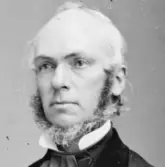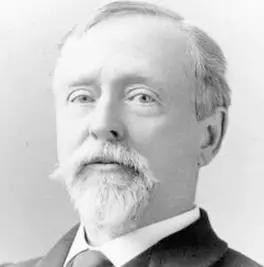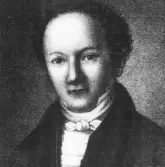About Us
We love names — especially biblical names. For centuries, names have been used not just to identify a person but to define their character, to reflect their background, and even to prophesize their future. Today, though, the meanings behind names are frequently ignored or forgotten. Here we provide you with thoroughly researched and vetted information on the meanings and origins of different names. Our research is drawn from the public work of Hebrew and Greek scholars:

Roswell D Hitchcock
(1817-1887)
Hitchcock was an American theologian and clergyman born in Maine in 1817. He studied at Amherst College, at the Andover Theological Seminary in the United States, and in Germany. From 1845-52 he was a minister at the Congregationalist Church in Exeter, New Hampshire. He became a professor and scholar of natural and revealed religion at Bowdoin College in Maine in 1852 and later was a professor of Church History in the Union Theological Seminary in New York City. Some of his most recognized books are the Complete Analysis of the Holy Bible (1869) and Hitchcock’s Bible Names Dictionary (1869).

Dr. James Strong
(1822-1894)
James Strong was an American biblical scholar and Methodist theologian born in New York City in 1822. In 1856 he received a Doctor of divinity from Wesleyan University, and spent the following decades as a renowned biblical scholar, local politician, and lexicographer. Strong is now best known for being the creator of Strong’s Concordance, a numbering method of Greek and Hebrew words (8674 Hebrew roots and 5523 Greek roots) first published in 1890. This method is now widely used in the English-speaking world. He died in New York in 1894.

Joseph Henry Thayer
(1828-1901)
Joseph Henry Thayer was a pastor and biblical scholar born in Boston in 1828. He graduated from Harvard in 1850 and from Andover Theological Seminary in 1857. He served as a pastor from 1858 until 1864, and then as a chaplain in the Civil War. In 1882 he becomes Professor of Sacred Literature at the Andover Theological Seminary and then in 1884 began teaching New Testament Criticism at Harvard. He was as well a member of the American Bible Revision Committee.
One of Thayer’s most well-known books is Thayer’s Greek–English Lexicon, which is a revised and translated edition of C.G. Wilke’s (a German theologian) 1841 Clavis Novi Testamenti. After numerous revisions by other scholars, Thayer took over the project. Thayer devoted nearly thirty years to the translation that first appeared in 1885, and updated this edition in 1889. Thayer died in 1901.

Wilhelm Gesenius
(1786-1842)
Gesenius was a German Lutheran theologian, lexicographer, and Biblical scholar born in 1786. He became professor of Theology at the University of Halle in 1810, where he would spend most of his renowned academic career. His large lexicon of Biblical Hebrew and Chaldee (Aramaic) was first published in 1829 Gesenius died in 1842 but the revision and expansion of his book continued until 1858.